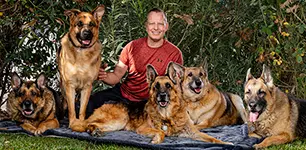
FAQ: Do You Use Shock Collars/e-Collars?
I usually don’t use e-collars for obedience training. Never say never, but 95% of the time, that would be an unnecessary and foolish idea.
However, I sometimes use them. Generally speaking, electric collars (e-collars) are overused in dog training. There is no need to train obedience with e-collars just because we can. I don’t even remember the last time I used an e-collar with a dog in our Board and Train program. It’s rarely necessary. If I think it is the best option, I will discuss it with you before I use it with your dog and explain why and how, so you can decide.
Aversives are used to either stop behaviors that must end or stop dogs from choosing competing reinforcers (e.g., squirrels) over commands. Many things can be aversive; it depends on context. Something that may be aversive in one context is not aversive in another. For example, a time-out (removal from a situation). If your dog doesn’t like visitors and you put him back in his crate, he may enjoy that. While another, very social dog, would hate it when there is a new person to interact with. It all depends.
E-collars are aversive. That’s the point. That is their purpose. They allow to quickly teach a dog to NOT do something by attaching unpleasant consequences to it. Sometimes they are necessary or at least the easiest and fastest way to a necessary outcome, but the keyword is SOMETIMES.
Using E-Collars for Stopping Behaviors
Let’s say your dog eats sprinkler heads, self-mutilates his tail, or chases kids on skateboards. In such scenarios, including an e-collar at some stage as part of a larger training plan can make a lot of sense or may be the only responsible option. For example, a dog chases his tail, catches it, and self-mutilates to the point of serious injury—daily! Are you interested in embarking on a 6-12 month differential reinforcement program that may or may not work out? Probably not. It would be irresponsible and not in your dog’s best interest to let him suffer further injuries. There are many other scenarios. With an e-collar, such behaviors can usually be reliably suppressed with a couple of applications.
Using Them For Competing Reinforcers
Dealing with competing reinforcers is another fair application for e-collars. For example, your dog has learned whatever commands you wanted him to learn with toys or food and is good at them. But, every time you go on a walk with him through squirrel alley, all he wants to do is chase them. For dogs, squirrels are fun to chase! If that is what your dog loves doing, you need to be able to stop him before he takes off and maybe gets hit by a car and dies. If done correctly, it won’t take many repetitions to end this dangerous activity next to a street. He can still chase squirrels in the backyard if you don’t mind.
In summary, yes, I sometimes use e-collars when I think it is in the best interest of the dog’s well-being in a particular case, but it’s not a major or frequent part of my training.
If you are interested in learning more about how e-collars should and shouldn’t be used, I recommend a recent podcast. On the Training without Conflict Podcast, Ivan Balabanov provided some great insights for dog trainers and dog owners. The episode is called The Disadvantages of Low Level E-Collar Conditioning.
If you are interested in more details on the aspects and components of dog training, I recommend my article on Positive Dog Training and my companion post to the TWC Podcast on The Real Fact About Science-Based Dog Training.
If you are ready to get help with your own dog(s), please use our dog training contact form to schedule a free phone consultation.
Please also check out our other FAQ answers:
Services and Area
We are located in Southern California and train dogs nationwide. Happy Dog Training currently offers local dog training services in the following counties. Riverside County, Orange County, San Bernardino County, Los Angeles County, and San Diego County. In addition, we offer our board-and-train program nationwide and all virtual training services worldwide.
Do you want your new puppy trained right from the start? Are you looking for help for your fearful dog? Do you need to resolve a severe aggression problem? You came to the right place! We are experienced, professional dog trainers. Ralf has trained over 1500 dogs in over 18 years, and Sarah has trained over 1200 dogs in over 11 years. Consequently, we can help you with any dog training goal.
What We Offer
For many of our clients, we train their dogs from puppyhood, getting them off to a great start. However, we also have extensive experience training rescue dogs from all imaginable backgrounds and circumstances. Our Board-and-Train program is our most popular.
We can help you, regardless of your dog's challenges or training goals. Being a professional dog trainer means having experience, knowledge, and skill. Further, we developed a highly effective training program to specifically help fearful dogs gain more confidence and become the best possible version of themselves. Building Confidence is our second most popular training program.
Last but not least, we are experts in dealing with all types of aggression in dogs and are often the trainers of last resort after many other programs have failed. Most of our aggressive dog clients previously spent significant money on half-baked solutions without much improvement. This is different from us. We will give you an honest assessment of what goals are realistic for your dog. We will tell you what can be resolved reliably and what likely needs to be managed before we start.
Our flagship product is our board and train program. But our virtual dog training and coaching services have become quite popular over the last couple of years. Our setup enables us to deliver online dog training services from our indoor and outdoor training areas. This allows us to help clients worldwide.
Other Resources
Also, check out our Free Dog Training tips on Separation Anxiety in Dogs, Potty Training aka Housebreaking, and Leash Handling for expert solutions to common challenges.
Additional Services: Presentations and Q&As on Dogs | Professional Service Dog Training
Contact Us and Start Training
Finally, once you're ready to move forward, please use our dog training contact form to schedule a free phone consultation or book a paid, in-person consultation.
Terms, Conditions and Privacy Policy
By using this website you agree to all Terms and Conditions and our Privacy Policy.
About Ralf and Sarah
Happy Dog Training is the pet dog training business of Ralf Weber and Sarah Gill. We are certified professional dog trainers in Southern California. We are specialized in advanced obedience training, all forms or behavioral challenges and service dog training. For behavioral training, we are known for our work with aggressive and fearful dogs. Our service dogs, through Total K9 Focus, have a nationwide reputation for their reliability, longevity and performance.
Ralf Weber, MS, TWC CPDT, IACP CDT, CDTA
Certified Professional Dog Trainer Ralf Weber is lead pet dog trainer of Happy Dog Training. Ralf is a long-time dog owner of German Shepherds. During his career, Ralf has worked with over a 1500 dogs of many different breeds. Moreover, Ralf has a thorough understanding of all aspects of canine training. This includes evolutionary psychology, ethology, and, most importantly, learning science. Ralf is specialized in resolving dog behavior challenges—especially fear and aggression. Apart from this, Ralf trains dogs in basic and advanced obedience, service dog tasks, and GRC Dog Sports. Ralf is further certified in a broad range of other canine training areas. Last but not least, Ralf is the author of the behavioral book If Your Dog Could Talk: Understand Your Dog Like Never Before.
Ralf loves helping people have a better relationship with their dogs. He is a certified professional dog trainer in the Training without Conflict™ methodology by Ivan Balabanov (TWC CPDT). Ralf is also a member of the International Association of Canine Professionals and also holds their basic and advanced dog trainer certifications (IACP CDT, CDTA). In addition, Ralf is an AKC-approved evaluator for the AKC Puppy Star, CGC, and Advanced CGC programs and is also certified in canine first aid by the Red Cross.
Sarah Gill, Certified Professional Master Trainer
Sarah Gill, is a professional service dog trainer and handler. Sarah entered the world of professional service dog training after a car accident. As a result, she had to use a wheelchair for almost two years, trying to maneuver in a house not designed for it. No one expected Sarah would walk again. This opened her eyes and became a driving force behind pushing herself to defy the odds. When she regained some stability, Sarah attended a dog training school and learned how to train service dogs. Sarah completed her Master Trainer Certification and gained further experience by training new trainers. However, the school wasn’t accommodating to those with physical difficulties and PTSD. Hence, Sarah moved home to Dallas. In 2019, Sarah teamed up with Ralf and moved to California.
Sarah started this journey because she had a trained dog to mitigate her disabilities. But Sarah needed additional tasking for a new diagnosis. The only option she could find was getting a second dog for the new diagnosis. She knew there had to be a different way to address this. Sarah's passion is changing the ways of the service dog training industry.


